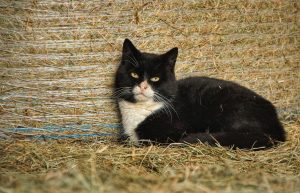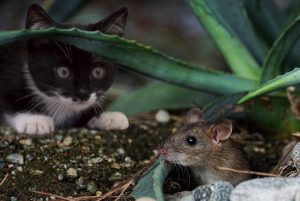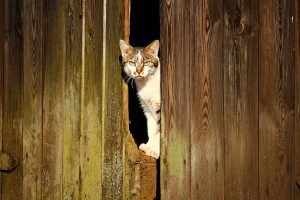Are you in need of some professional rodent managers?? Would you like to use all-natural pest control? Here’s the scoop on how you can hire working cats for free!
As part of their ‘No Kill’ mandate, the Nova Scotia SPCA is constantly trying to find opportunities for cats who lack trust with humans and need a special type of placement. The SPCA always strives to find the best outcome for every animal and the Barn Cat Program was created with this goal in mind.

Through TNR (Trap-Neuter-Return), cats are often recovered that are not adapted to living in homes as typical companion pets. They come from an environment where they have lived outside for most or all of their lives and have either very little or absolutely no direct interactions with people. If placed in a shelter or home environment, they endure immense stress and often act aggressively or are frozen in fear. Although the cat’s preference would be to return to their outdoor home, there are times where they cannot be released back to the property they came from – usually because there is no longer a caretaker. While these cats don’t want to be house pets, they make wonderful ‘working’ cats and the Barn Cat Program allows them to comfortably live out their lives in a safe environment that is as similar to their ‘home’ as possible.
In these cases, the SPCA tries to find members of the public who are willing to take them in as working cats. The cats come fully vetted – they have been vaccinated, dewormed, flea treated and spayed/neutered. Plus, there is no adoption fee for cats in this program!
Working Cat Adopters need to commit to:
- provide a forever home for these cats in a barn or other secure building – for example, a warehouse – where they are safe from wildlife and have a warm dry place to sleep
- keep them confined for a period of time while they learn about their new home
- provide ongoing food*, water, shelter and medical care in the future for any illness or injury
*Cats can’t survive on hunting mice alone; they actually catch more mice if they are fed a diet to keep them healthy and strong.

You won’t find these cats on the SPCA website, but you can be put on a waitlist to be contacted when the SPCA has cats in need of a barn placement. The SPCA strives to fit the working home with the temperament of the working cat.
Recently, the SPCA was alerted that a caregiver for a group of cats was in the hospital. These cats, although living outdoors, relied on their caregiver for food. In return, they provided their caregiver companionship in their own way. The caregiver was deeply attached to the cats and loved them very much. Before the caregiver’s death, the caregiver expressed their wish that other opportunities could be found so the cats could live happy lives. The SPCA fulfilled their wish.
The cats trusted their one human caretaker but had never experienced indoor life. Because of this, many of them are happier in similar surroundings. Barn environments are a great way for the cats to decide at their own pace when and how much human interaction they want. As with all animals, working cats should be treated with kindness and caring. But it’s important to understand that they do not want to be treated or handled like indoor pet cats.
To reduce the stress and shock on their lives, the SPCA minimized the amount of time the cats were contained. The cats were medically assessed, spayed/neutered and evaluated for the living situation that would be purr-fect for their unique needs. Of the 51 cats recovered, 27 cats showed their preference for a more independent living situation and were placed in working home environments. The remaining 24 are being adopted or are in foster for further evaluation.

The program is a definite win-win.
- Working cats benefit their caretakers! They provide all-natural rodent control. There are no poisons for children or pets to get into and no need to set endless traps. They’ll help keep rodents away from grain and food storage areas, and you’ll enjoy watching the cats and having the satisfaction of giving them a much-needed home.
- For feral and semi-feral cats, this is a dream solution! They are placed in forever homes in barns or other buildings where they are safe, wanted, valued and cared for.
Feedback from folks who have adopted cats through the program has been overwhelmingly paws-itive. I caught up with Valerie who told me that they adopted 2 cats recently. “Our daughter named the cats Riri and Fifi. They’ve only been with us for 3 weeks, but they’ve made a huge impact already. We’re thrilled that all the rodents have moved out of the grain storage shed!” says Valerie. The cats have settled in very well in a short time. “RiRi and Fifi are the best of friends and love snuggling together in the shed window while they soak up the sun. Our whole family enjoys watching them in the window,” she relates. “We decided to get the cats comfortable with one person first, so my husband Neil brings them their meals each day. They really love canned cat food and they don’t run away from him anymore. RiRi and Fifi will eventually be introduced to our family’s other barn cat Luna and our sheepdogs who keep all our animals safe. We’re one big happy family!”
If you have a nice warm barn or building that needs a cat patrol or if you know of an opportunity to place one or more working cats, please contact the SPCA – email: catcolony@spcans.ca or fill out the adoption application and specify ‘Barn Cat’ in the location. Together, we can give these special cats a second chance at living a happy and healthy life!
